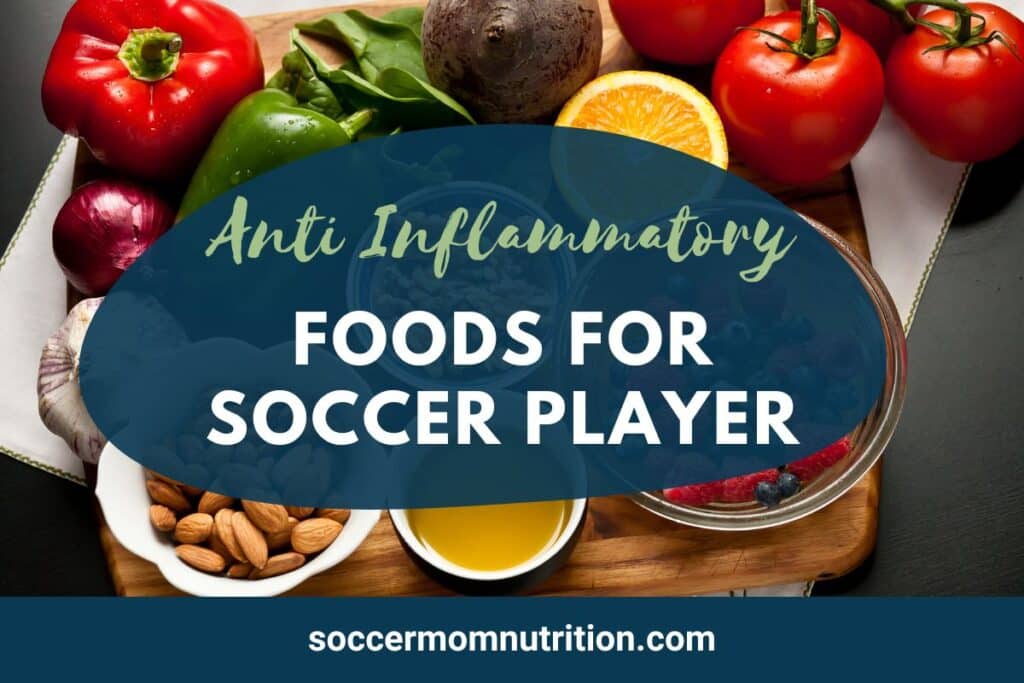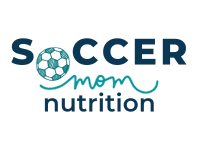Anti Inflammatory Foods for Soccer Players Ultimate Guide
Fueling your body with the best nutrition by including anti inflammatory foods for soccer players is essential to excel on the field and recover effectively.
This is especially important in sports like soccer, where agility, endurance and injury prevention are critical.
One of the key aspects of a soccer player’s diet is to include anti inflammatory foods that fight inflammation, which can be caused by intense training, stress or injury.
Inflammation can slow down your recovery, hurt your performance and increase your risk of chronic diseases.
Fortunately, there are many delicious and nutritious foods that have anti-inflammatory effects and can help you reach your athletic goals.
These anti-inflammatory foods contain antioxidants, polyphenols, omega-3 fatty acids and other compounds that can reduce inflammation and support your overall health.
Read on to find out about 25 of our favorite anti-inflammatory foods for soccer players.

#1 Salmon
This fatty fish is rich in omega-3 fatty acids, which are essential for reducing inflammation and supporting muscle recovery. Omega-3s can also improve blood flow, brain function and mood.
Salmon is a great source of protein and vitamin D, which are important for bone health and your immune system.
Add smoked salmon to your bagel and cream cheese for a satisfying and filling breakfast.
#2 Walnuts, almonds, and pumpkin seeds
These nuts and seeds are packed with healthy fats and antioxidants that can lower inflammation and protect your cells from damage.
They also provide protein, fiber, magnesium and zinc, which are vital for energy production, muscle function and immune system.
Snack on a handful of nuts or seeds before or after training to boost your nutrition.
#3 Beets
These root vegetables are high in nitrates, which can improve blood flow and oxygen delivery to your muscles. This can enhance your endurance and reduce muscle fatigue.
Beets also contain betalains, which are pigments that have anti-inflammatory and antioxidant properties. They can help reduce muscle damage and inflammation after exercise.
Add some roasted beets to your salad or drink some beet juice before a game to improve your performance.
#4 Berries
Bursting with antioxidants and polyphenols, berries like blueberries and strawberries aid in reducing exercise-induced inflammation and supporting recovery. They also provide vitamin C, which is essential for collagen synthesis and wound healing.
Berries are low in calories and high in fiber, making them a perfect snack for soccer players.
Add to a yogurt and granola bowl for additional sweetness and gluten free carbs for energy.
#5 Dark leafy greens
Spinach, kale and other dark leafy greens are rich in vitamins and minerals, providing anti-inflammatory benefits to support muscle repair and recovery. They also contain nitrates, which can boost nitric oxide production in the body and improve blood flow.
Dark leafy greens are versatile and can be added to salads, smoothies, soups or sandwiches.
#6 Whole grains
Opt for whole grains like quinoa and brown rice, which offer fiber and antioxidants that support sustained energy and aid in post-training recovery. They also contain complex carbohydrates, which are the main source of fuel for your muscles during exercise.
Whole grains can help regulate blood sugar levels and prevent spikes or crashes that can affect your performance.
Choose whole grain crackers, toast or bagels for an added fiber boost at meals.
#7 Olive oil and avocado oil
These healthy oils contain omega-3 fatty acids and antioxidants that reduce inflammation and promote cardiovascular health. They also provide monounsaturated fats, which can lower cholesterol levels and improve blood pressure.
Olive oil and avocado oil are great for cooking or dressing salads.
#8 Tart cherries
Enjoy the natural sweetness of tart cherries, which contain ingredients that fight inflammation ease muscle soreness and aid recovery, making tart cherry juice an essential recovery drink after a tough game.
Tart cherries contain anthocyanins, which are flavonoids that have anti-inflammatory and antioxidant effects. They can also help regulate melatonin levels and improve sleep quality, which is crucial for recovery.
Pack tart cherry concentrate in your gear bag so you can start your recovery as you leave the field.
#9 Soy beans
Rich in plant based protein and antioxidants, soybeans help reduce inflammation and support muscle repair after workouts. They also provide isoflavones, which are phytoestrogens that can modulate estrogen levels and have anti-inflammatory benefits.
Soybeans are a good alternative for vegetarians or vegans who want to increase their protein intake.
Enjoy soymilk in a smoothie or choose a vegan rice bowl with marinated tofu and veggies.
#10 Low-fat dairy
Milk and yogurt provide protein and essential nutrients that aid in muscle recovery and reduce inflammation. They also contain calcium and vitamin D, which are important for bone health and preventing stress fractures.
Low-fat dairy products can also help replenish fluids and electrolytes lost during exercise.
Add some low-fat milk, high protein milk or yogurt to a post game smoothie to support recovery.
#11 Avocado
Avocados offer healthy fats and antioxidants, contributing to reduced inflammation and muscle recovery. They also provide potassium, which is an electrolyte that helps maintain fluid balance..
Avocados make a great addition to a snack or meal, helping you feel full and satisfied.
#12 Sweet potatoes
With their anti-inflammatory compounds like beta-carotene, sweet potatoes are a great gluten free source of carbs making them a good choice for a pre game meal or post game snack.
They also provide vitamin A, which is essential for vision and immune function. Sweet potatoes are high in fiber, which can help regulate digestion and prevent constipation.
Add roasted sweet potatoes to a breakfast burrito with black beans for a satisfying breakfast.
#13 Broccoli
Broccoli contains powerful antioxidants and anti-inflammatory properties, supporting muscle repair after intense workouts, an all-star player in your player diet.
It also contains sulforaphane, which protects against oxidative stress and inflammation.
Broccoli is also rich in vitamin C, folate and iron, which are important for blood health and oxygen transport.
Add broccoli to your pesto pasta salad for a fiber-rich and filling post game meal.
#14 Oranges
Packed with vitamin C and antioxidants, oranges help reduce inflammation and support immune function. Vitamin C is also involved in collagen synthesis, which is important for tissue repair and wound healing.
Oranges are also high in water content, which can help prevent dehydration and fatigue making them an excellent halftime snack.
Eat an orange before or after a game to boost your hydration and nutrition.
#15 Papaya
Papaya contains enzymes like papain that have anti-inflammatory benefits and aid digestion, making them a valuable addition to your soccer player diet.
Papain can also help break down proteins and facilitate their absorption, which can enhance muscle recovery.
Papaya is also high in vitamin C, vitamin A, and fiber, which can support your overall health.
Blend papaya into your pre game smoothie to enjoy a high carb energy boost with a tropical flavor.
#16 Watermelon
Stay hydrated and reduce inflammation with watermelon, which contains antioxidants like lycopene, a refreshing and essential player for game day.
Lycopene can help protect your cells from oxidative damage and inflammation caused by exercise.
Watermelon is also high in water content, which can help replenish fluids lost during sweating.
Enjoy some watermelon slices as a post game snack to cool down and recover.
#17 Onions
Onions offer anti-inflammatory properties and support heart health, becoming a crucial part of your nutrition program. They contain quercetin, which is a flavonoid that can modulate inflammatory pathways and protect against cardiovascular diseases.
Onions are also low in calories and high in flavor, making them a great addition to your salads, soups or sandwiches.
#18 Kiwi
Rich in vitamin C and antioxidants, kiwi helps reduce exercise-induced inflammation scoring big on your player diet list. Kiwi also provides vitamin C, which is essential for collagen synthesis and wound healing.
Kiwi is also high in fiber, which can help regulate digestion and prevent constipation.
Eat a kiwi before or after a game to boost your hydration and nutrition. Kiwi may also be beneficial in aiding sleep.
#19 Red bell peppers
With high vitamin C and antioxidant content, red bell peppers aid in reducing inflammation, an important addition to your nutrition program. Vitamin C is essential for collagen synthesis, which is important for tissue repair and wound healing.
Antioxidants can help protect your cells from oxidative damage and inflammation caused by exercise. Red bell peppers are also low in calories and high in fiber, making them a filling and nutritious snack or meal component.
Add chopped red pepper to your favorite burrito bowl or slice and add to a sandwich.
#20 Green tea
Stay hydrated with green tea, containing the powerful antioxidant EGCG linked to reduced inflammation and improved athletic performance. (1)
Consult your sports dietitian nutritionist or provider to discuss incorporating green tea into your diet since it does contain caffeine.
#21 Garlic
Add flavor and anti-inflammatory benefits with garlic, containing compounds that help reduce inflammation and support immune function.
Garlic contains allicin, which is a sulfur compound that can block inflammation. Garlic can also help lower blood pressure and cholesterol levels, which can improve cardiovascular health.
Add some minced garlic to your salads, soups or sauces to enhance your dishes.
#22 Dark chocolate
Satisfy your sweet tooth with dark chocolate, packed with flavonoids and antioxidants that reduce inflammation and improve blood flow. Dark chocolate helps to make nitric oxide, which helps improves oxygen getting to your muscles.
Enjoy a small piece of dark chocolate as a treat after a game or for a sweet snack mixed with dried fruits and nuts in a trail mix.
#23 Oatmeal
High in fiber, antioxidants, and complex carbohydrates, oatmeal supports gut health, reduces inflammation and provides sustained energy for training, an underdog but good food to add to your soccer meal plan.
Fiber can help feed the beneficial bacteria in your gut, which helps make anti-inflammatory substances. Oatmeal also contains beta-glucan, which is a type of fiber that can lower cholesterol levels and modulate immune responses.
Have some oatmeal for breakfast or as a pre game meal to fuel your body right.
#24 Pineapple
Enjoy the tropical goodness of pineapple, containing the enzyme bromelain with anti-inflammatory properties that aid in alleviating muscle soreness, a secret weapon for your game day meal.
Bromelain can help break down proteins and facilitate their absorption, which can enhance muscle recovery.
Bromelain can also stop inflammation and reduce swelling and pain. (2)
Eat some fresh pineapple or drink some pineapple juice as a post game snack to cool down and recover.
#25 Green leafy vegetables
Include vegetables like lettuce, arugula, and bok choy in your diet, as they are rich in antioxidants and anti-inflammatory compounds.
They also provide vitamins A, C, K, folate, iron, and calcium, which are important for vision, immune function, blood clotting, oxygen transport and bone health.
Green leafy vegetables are low in calories and high in water content, which can help you stay hydrated and full.
Add some green leafy vegetables to your salads, smoothies, soups or sandwiches to increase your intake of these superfoods.
Conclusion
Eating anti-inflammatory foods for soccer players is one of the best ways to optimize your performance and recovery. These foods can help you lower inflammation, speed up muscle repair, and increase your endurance on the field.
They can also protect your health and prevent inflammation-related problems.
These 25 anti inflammatory foods for soccer players are some of the best choices for soccer players since they provide a variety of nutrients and antioxidants that can benefit your body and mind.
Add them to your diet and feel the difference.
Let us know your favorite in the comments section.
Join our mailing list and get our FREE Pre-Activity Fueling Guide.
Stephanie Magill, MS, RD, CD, FAND has over 22 years of experience in public health and nutrition. As a performance registered dietitian nutritionist, Stephanie specializes in sports nutrition and provides simple and actionable information so that athletes can be well fueled for high performance on and off the field. Stephanie has a Master’s Degree in Nutrition and is a Fellow of the Academy of Nutrition and Dietetics.

